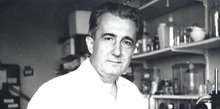Mirko Beljanski
Mirko Beljanski (27 March 1923 – 27 October 1998) was a French-Serbian molecular biologist, notable in the latter part of his career for devising and promoting a number of ineffective cancer treatments, and for treating French president François Mitterrand with them.[1]
Mirko Beljanski PhD | |
|---|---|
 | |
| Born | March 27, 1923 Turija, Yugoslavia |
| Died | October 27, 1998 (aged 75) Paris, France |
| Alma mater | University of Paris |
| Spouse(s) | Monique Lucas |
| Children | 1 |
| Awards | Charles-Léopold Mayer Prize (1960) |
| Scientific career | |
| Fields | Molecular biology |
| Institutions | Pasteur Institute |
| Doctoral advisor | Michel Macheboeuf |
Beljanski was found guilty of medical malpractice in 1994. Both he and Mitterrand subsequently died of cancer.
Career
Beljanski was born in 1923 in Yugoslavia. He came to France to study, and lived there for the rest of his life. He was married to Monique Lucas,[2] daughter of René Lucas and granddaughter of Pauline Ramart. He received a PhD in 1948 from the University of Paris. In 1948, he entered the CNRS and worked at the Pasteur Institute in Paris as a researcher in molecular biology.[3] Beljanski was made to leave the Pasteur Institute in 1978, after pursuing research against the advice of the institute, but still continued to publish scientific papers.[4] He was at the Faculty of Pharmacy of Châtenay-Malabry until his retirement in 1988.
Beljanski believed he had found antivirals effective against cancer and AIDS. A product made from extracts of the Brazilian Pao pereira tree[5] and called PB100 was claimed to be superior to AZT, which Beljanski called "real poison".[2] Customers included François Mitterrand (via a homeopath called Philippe de Kuyper).[6] There was never any evidence that any of the products Beljanski promoted were effective medicine; the French Department of Health accused him of illegally practicing medicine in 1991, and he was found guilty of malpractice in 1994.[4] In 2002, the European court of human rights ruled that the length of a second criminal investigation had been excessive and made a financial award to his widow.[7][8]
Death
Beljanski died from cancer in Paris on 27 October 1998.[1]
References
- Abgrall, Jean-Marie (2007). Healing Or Stealing?: Medical Charlatans in the New Age. Algora Publishing. pp. 137–138. ISBN 978-1-892941-28-2. Archived from the original on 3 July 2020.
- "Mirko Beljanski: Je préfère me mettre dans l'illégalité". L'Humanité (in French). 5 October 1993. Retrieved 11 August 2010.
- Kouchner, Annie (20 January 1996). "14 ans d'intrigues à l'Élysée". Le Point (in French). Retrieved 11 August 2010.
- "L'Etrange cas du professeur Beljanski". Le Point (in French). 26 January 2007. Archived from the original on 3 January 2015. Retrieved 11 August 2010.
- "Pao pereira | Memorial Sloan Kettering Cancer Center". www.mskcc.org. Retrieved 2017-06-19.
- Eric Favereau (14 April 1995). "L'entourage d'un médecin de Mitterrand crée des remous". Libération (in French).
- "HUDOC - European Court of Human Rights". hudoc.echr.coe.int. Retrieved 2017-06-19.
- Scharf, Michael P.; Newton, Michael A.; Sterio, Milena (2015-05-28). Prosecuting Maritime Piracy: Domestic Solutions to International Crimes. Cambridge University Press. ISBN 9781316299852.